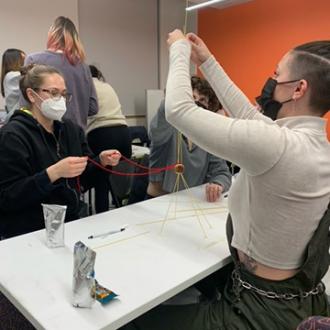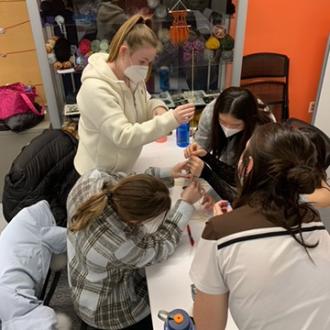Tell us about your Leadership course, Strengths-Based Conflict Resolution
In fall 2021, I proposed this course to tie the Clifton Strengths Finder to skills in conflict resolution. I've learned that conflict resolution is not easy for students, faculty, or staff. Particularly after COVID-19, managing conflict in person after being behind a screen has been even more challenging.
I developed a course to teach students how to leverage strengths, manage conflict, and make sure your voice is heard in the most effective way. These skills are a benefit to our undergraduate population and future students who will have a chance to participate in the program.
Assistant General Counsel & Title IX Coordinator Sara Simberg visited the class as a guest speaker on restorative justice, and the difference between conflict resolution and mediation. Sara will be creating a pilot for a peer mediation program as part of her Jennifer Eckert Leadership Fellowship.
What do you see as the value of this course? What do you hope students take away from the experience?

First, I hope that students understand that conflict isn't bad. There are multiple different ways to handle conflict, and there is a difference between trying to win and trying to resolve conflict, or come to some common ground. It's important to engage with conflict to get to know one another.
When we think of some of the major issues we see in our world, many times it's the lack of communication, the unwillingness to communicate, or our desire to win that ensures no resolution. Our students are focused on social justice and equity, and resolving conflict is a part of that.
The ability to give grace in those conversations and to develop a healthy curiosity for one another is vital. Once you know someone's name and you have a conversation with them, that makes it easier to give grace and engage in healthy discourse. It's beneficial for our students to explore how to interact with one another, and with future bosses, spouses, friends, and foes. They will be stronger and more confident in using their voice.
Does the subject tie into your own work/research/interests?

It fits in with my professional work in a couple ways. I've taught leadership courses for many years, in graduate programs for Student Affairs practitioners, and leadership theory at the undergraduate level. In Student Affairs, I'm helping students navigate this journey of college, and hope that every student grows along the way. Student development work is part of that trajectory, which ties to this course: if you want to be a strong, effective leader, managing conflict — and helping others to do so — is an important skill.
How do you teach these concepts in a classroom setting?
I designed the class to be very little lecture and almost all hands-on. Each class included a brief overview of the content, then we watched videos and had guest speakers. I welcomed Stacey Harris, now Dean of Students at William & Mary, who built Boston University's conflict resolution program. I also held Lunch & Learn sessions for faculty and staff to hear the guest speaker, as well.

During the course, we watched Elizabeth Lesser's TED Talk about Taking "the Other" to Lunch, which covered how she set ground rules when in conversation with someone with a strongly different political view, in order to try to understand the other's perspective. Students were then assigned to find someone with an opposing viewpoint and have a conversation with them. We also watched William Ury's TED Talk, The Walk from No to Yes, then paired with a classmate who had a different opinion on a particular topic, and they went on a walk until they got to yes, whatever yes was — it could be a compromise, or one could have swayed the other.
The team project at the end of the semester required them to look at a conflict from two different perspectives and present on how difficult it was to take a perspective that they didn't want to take, and how they resolved the conflict within their team. I also assigned weekly reflections on their readings, to consider what they understood about themselves and reflect on how they might use what they learned to manage conflict outside of class.

